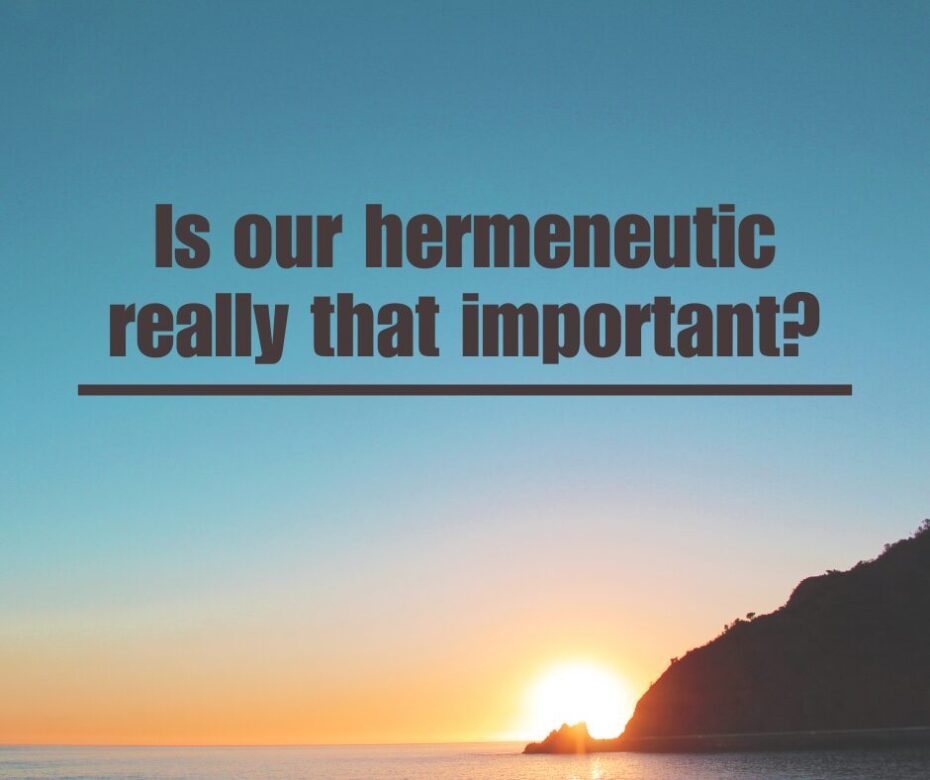One of the characteristics of dispensationalism is that it makes a distinction between Israel and the Church. When you discuss such issues, it is common to hear people say that it is no big deal. We shouldn’t get bent out of shape over such things. There have been a lot of godly men and women who were not dispensationalists. There will be a lot of folks in the kingdom who were not dispensationalists.
That is true. People who are not dispensationalists believe in the gospel of eternal life every day. Many of them have never even heard of dispensationalism. They may live their whole lives without knowing what it is.
But don’t think for a second that it is not important.
Just this week, I heard a preacher on the radio speaking about the meaning of baptism. He started off his message in a great way. From what I could tell, he was speaking to a fairly large crowd, and he reminded them that eternal salvation is by God’s grace, through faith, apart from works. That was a great beginning.
But then he started talking about John the Baptist. He said that John shows us the importance of water baptism. He said that we are just like John. Before a person can believe and be saved, we must get them to repent. Baptism is the “seal” of our repentance.
I kept expecting him to explain what all that meant. He didn’t.
He then asked the audience how many of them had been baptized. I couldn’t see, but he said “good” when some of them raised their hands. He then asked how many of them had not been baptized. He commented that they would have the opportunity to do so at a later time. On that day, they would be able to confess their sins. He concluded his message by emphasizing once again that our message must be like John the Baptist’s.
This preacher was a polished speaker. He had prepared his message. The large crowd indicated that the people saw him as a Christian leader.
But I have no idea what he meant. The title of his sermon, “The Purpose of Baptism,” was an enigma to me. What was he saying the purpose of baptism is? Is it a recommendation? Is it a work necessary for a salvation that is apart from works? Were the unbaptized people in the congregation, by definition, unsaved? Must the newly baptized believer confess his sins, or is that also a suggestion?
I really don’t want to be mean, but what did the people in that auditorium and those who were listening on the radio think? At the very least, they would have wondered whether they had to get baptized before they could be saved by grace. That would include turning from and confessing their sins.
The speaker sounded like a nice enough guy. But he surely did not see how grossly contradictory his message was.
It was also obvious that he did not see a distinction between Israel—and John’s message to her—and the Church. If he had, there is no way he could have said what he said.
Can a person believe in Jesus for eternal life and not be a dispensationalist? Can he be convinced that he has eternal life that can never be lost simply because Christ promises it? Can he understand that baptism plays no part in it whatsoever? Absolutely, on all counts. Will there be non-dispensationalists in the kingdom? Bunches of them.
But if you are a believer and don’t see a difference between Israel and the Church, it is probably best to leave John the Baptist alone. If you are asked to expound on his message, just say you will pass. Admit you don’t know what John was saying. Otherwise, you will be like one of those pretzels you see at a county fair—all twisted around in a knot.
We will have neighbors in the kingdom who were not dispensationalists. That leads some to say it isn’t important. But if we are going to expound on the Scriptures, we will find that sometimes it is more important than we might think.


